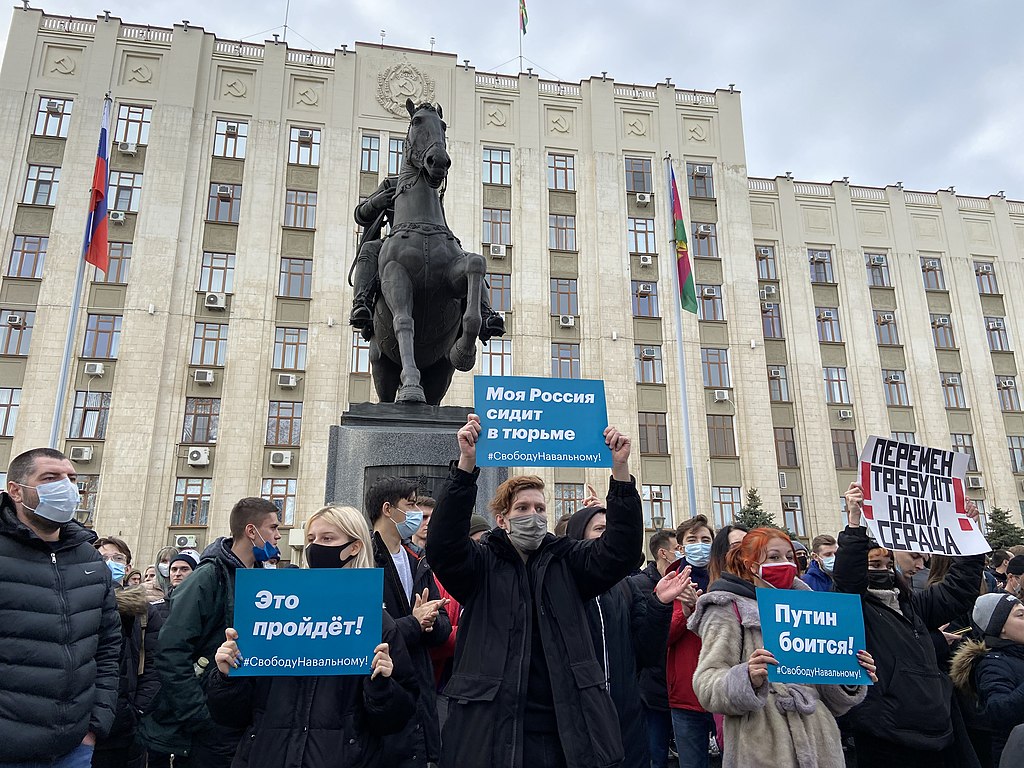 Photo Courtesy: Victor733 on Wikimedia
Photo Courtesy: Victor733 on Wikimedia
Civil Society Crackdown in Russia
Russian President Vladimir Putin has imposed a strict civil society crackdown in the country in recent months, highlighting his unwillingness to tolerate even minor threats to his rule. Putin recently ensured his continued presidential eligibility through 2036, put anti-corruption activist Alexei Navalny in jail, and has now set his mind to getting rid of the remaining media and opposition networks.
Crackdown on the Media, Organizations, and Opposition
Russia has decided to dismantle Alexei Navalny’s network in full, as Russian prosecutors have moved to suspend the activities of the regional offices of Navalny’s Anti-Corruption Foundation (FBK). Furthermore, a court is currently considering whether to designate the FBK and Navalny’s regional offices as extremist organizations. This would not just ban the FBK from operating in Russia, but also equate it with the terrorist organizations Al-Qaeda and the Islamic State of Iraq and the Levant. Navalny’s team has stated that even as the court debates this designation, it has become too difficult and dangerous for them to continue their anti-corruption work in Russia. This action follows the arrests of many prominent members of the FBK, including Navalny, in recent weeks and months. It is apparent that Putin is determined to prevent the FBK from operating at all.
Moscow is accelerating a crackdown on the media and stifling freedoms. Russia’s foreign agent law was brought into force in 2012 in order to target media outlets and civil society groups, and in recent years has expanded to include individual journalists and any foreign-funded persons or entities. Russia recently designated the independent news website Meduza a “foreign agent” media outlet. Another “foreign agent” is the U.S. funded Radio Free Europe / Radio Liberty news, which is facing over $30 million in fines for violating Russia’s foreign agent labeling requirements. These designations will make it immensely difficult for both media outlets to continue their normal operations. This will severely inhibit the ability of Russians to get access to independent news media that focuses on Russian domestic and foreign issues.
Furthermore, Russia is arresting opposition activists and allies of Navalny. In a police raid on March 13, Moscow officers detained 200 delegates at a conference of independent municipal lawmakers and activists. Those arrested were charged with the administrative offense of taking part in activities of an “undesirable organization”. Protests have continued, with the most recent of them occurring on Wednesday, April 21, the same day Putin was giving an annual speech to lawmakers and regional governors. Nearly 1,800 people were detained across Russia at the protest. Multiple people have also been arrested this past week, such as Andrei Borovikov, a former coordinator for Navalny’s offices, who was arrested on politically motivated charges that he spread pornography by reposting a music video. Ivan Pavlov, a leading defense lawyer was also just detained on charges of sharing investigative details from the case of a prominent former journalist accused of treason that Pavlov was to represent. Pavlov also represents Navalny’s FBK team in their extremism case. These arrests are designed to prevent any opposition in the upcoming September Duma elections, and to eliminate supporters and allies of Navalny.
The Impact of this Civil Society Crackdown
There is little tolerance left in Russia for any sort of independent media or opposition networks. Just as he did when he extended his presidential eligibility through 2036, Putin is ensuring his rule is long and relatively free of domestic threats, by working to break the opposition. These acts of intimidation may not be new in Russia, but they have heightened this year. This crackdown on the opposition shows that Putin is becoming increasingly intolerant of any challenge to his rule or policies, and he will continue to crackdown on civil society until there is virtually nothing left. While previously some opposition had been allowed, coupled with frequent crackdowns, this latest clampdown marks a turn toward a much stricter approach. The large number of arrests of activists and opposition leaders, along with heavy crackdowns on the press and media freedoms highlights the increasing authoritarianism in Russia. Putin is moving Russia into a stage of wholesale repression. This decision is not without risk, as this repressive turn can create an unpredictable domestic response by the people, but the Kremlin has decided that these risks are worth it. At this point Putin would rather deal with the risks of having no opposition, as opposed to selectively repressing and managing it instead.





